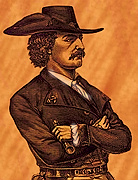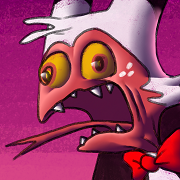|
So I really like Aldous Huxley's Brave New World a lot. It depicts a fascinating dystopian society and delves into a lot of things I have a real interest in like social engineering. I appreciate the detailed, meticulous construction of this nightmare reality. But when people want to scaremonger and invoke some piece of fiction to get across their point, they pick Orwell's 1984. I got nothing against the book but I don't know why it is one of the single most used - and probably abused - piece of fiction of all time. Is there some special character to 1984 that lends it to being brought up more than BNW? Is it as simple as 1984 being a pure hellhole that nobody can fail to miss while BNW is more insidious, presenting a "utopia" on the surface that has an undercurrent of you screaming about how horribly wrong everything is?
|
|
|
|

|
| # ? Apr 25, 2024 10:01 |
NikkolasKing posted:
It's pretty quotable.
|
|
|
|
|
BNW literally depicts a world of joy, there's no way around it. Yeah, "philosophically", it's terrifying. For the tidy, celibate scholar, it is a hideous portrait. For the vast majority of people, however, it would be a wonderful world to live in.
|
|
|
|
NikkolasKing posted:Is there some special character to 1984 that lends it to being brought up more than BNW? Is it as simple as 1984 being a pure hellhole that nobody can fail to miss while BNW is more insidious, presenting a "utopia" on the surface that has an undercurrent of you screaming about how horribly wrong everything is? Probably because there are still parallels between 1984 and things that occur today, like newspeak.
|
|
|
|
pseudanonymous posted:Probably because there are still parallels between 1984 and things that occur today, like newspeak. i can't think of any parallels between brave new world, where people are kept in a state of forced happiness through psychological manipulation and drugs, and the world of today
|
|
|
|
1984 gets mentioned more cos its really easy to point at things and go "oooh thats bad thats like 1984" on the surface without any engagement with the reasons why things are bad. it has catchy words for things everyone agrees are bad and you can accuse people of doing without technically needing to mean anything
|
|
|
|
The Unholy Ghost posted:BNW literally depicts a world of joy, there's no way around it. tidy celibate scholars being the only people opposed to caste systems and genetically engineered subhuman slave classes
|
|
|
|
the capitalist ruling class can point at 1984 and go 'abooga abooga thats what will happen to you if you get rid of us booga boo'
|
|
|
|
1984 is "OH SCARY" when pointing the finger at Totaliarian and Soviet badmen. Totally NOT the United States GOOD GUY culture of good hombres and our contemporary capitalist consumer culture empire that is quickly leading the charge of making the planet unlivable to ourselves. NOT AT ALL. It's about BAD MEN. Like Hitler. Probably. Stalin? Maybe. NOT US. IN NO WAY US. MAYBE. OK BUT IF IT IS ABOUT US IT THE BAD MEN WHO ARE TOTALLY SOMEONE ELSE NOT ME. It's very easy to do that with 1984. Especially since the title is basically now a meme at this point. Brave New World is much more nuanced, and thus harder to constantly quote/scaremonger with. Personally, Brave New World is a much better and scarier book. For example, the main character of 1984 gets brainwashed and reprogrammed but at least is alive and happy. Not so much in Brave New World.
|
|
|
|
poo poo, are you telling me there are people out there that look at the last lines of 1984 and think it's a happy ending?
|
|
|
|
Aces High posted:poo poo, are you telling me there are people out there that look at the last lines of 1984 and think it's a happy ending? Is this surprising considering how illiterate Americans have become? lol Most Americans still think Orwell was criticizing socialism in this book because they still believe socialism/leftism and totalitarianism are not mutually exclusive. 1984 is quoted all the time - correctly and incorrectly - because its concepts like 24/7 surveillance (NSA), newspeak, double-talk, endless war (real or imagined for propaganda purposes), "thought crimes", and memory hole (rewriting history) are all pretty loving relevant in the present? The billionaire class and government agencies are effectively using all these methods and concepts to varying degrees today. The Unholy Ghost posted:BNW literally depicts a world of joy, there's no way around it. This. gently caress, I probably would prefer it in many ways at this point.
|
|
|
|
i love to take lessons in what is good and bad in socialism from an eton educated imperialist policeman snitch
|
|
|
|
Comrade Cheggorsky posted:i love to take lessons in what is good and bad in socialism from an eton educated imperialist policeman snitch Same but unironically.
|
|
|
|
NikkolasKing posted:So I really like Aldous Huxley's Brave New World a lot. It depicts a fascinating dystopian society and delves into a lot of things I have a real interest in like social engineering. I appreciate the detailed, meticulous construction of this nightmare reality. 1984 is referenced more often because, between the two, its the simpler book. 1984 only requires that you understand the ideas of censorship and totalitarianism. BNW requires that you understand the gist of eugenics and hedonist nihilism and conditioning, etc. 1984 is easier to reduce to sound bites ("we have always been at war with..."). That isn't to say 1984 is bad - its just easier to discuss on a surface level. As an aside, have you read Huxley's Island? Its literally all the same ideas and methods of social engineering but presented as a utopia.
|
|
|
|
Dienes posted:1984 is referenced more often because, between the two, its the simpler book. 1984 only requires that you understand the ideas of censorship and totalitarianism. BNW requires that you understand the gist of eugenics and hedonist nihilism and conditioning, etc. 1984 is easier to reduce to sound bites ("we have always been at war with..."). That isn't to say 1984 is bad - its just easier to discuss on a surface level. I have not. I'll look into it, tahnks.
|
|
|
|
The difference, from my reading, is that 1984 is ordinary schmucks trying to survive in a world steadily growing crazier. Brave New World spends half the book just setting up the whole process of world-building; by the time, you've passed the cloning vats, the pre-natal conditioning, and the societal programming (oddly, no genetic engineering), it's barely recognizable as a human society. It's harder to make a reference to Soma or Epsilons than to Big Brother or...what other references are there from 1984?
|
|
|
|
Cobalt-60 posted:It's harder to make a reference to Soma or Epsilons than to Big Brother or...what other references are there from 1984? Sham bam bamina! fucked around with this message at 05:50 on Jun 13, 2020 |
|
|
|
I think that We is more interesting and meaningful than either because it presents an overtly utopian society with no cost but adherence to it.
|
|
|
|
Some thoughts about Brave New World vs. 1984 that are only tangentially related to their political (ab)uses: I often see people talk about Brave New World as though it's some kind of more nuanced response to 1984, or at least as though Brave New World contained insights that Orwell was oblivious to. This is almost getting it backwards. I don't just mean the simple chronological fact that Brave New World was published over 16 years earlier; I mean that Orwell had, in fact, read Brave New World and had some interesting things to say about it, and also about We: Notes on the Way posted:Mr Aldous Huxley's Brave New World was a good caricature of the hedonistic Utopia, the kind of thing that seemed possible and even imminent before Hitler appeared, but it had no relation to the actual future. What we are moving towards at this moment is something more like the Spanish Inquisition, and probably far worse, thanks to the radio and the secret police. Review of “WE” by E. I. Zamyatin posted:So far the resemblance with Brave New World is striking. But though Zamyatin's book is less well put together--it has a rather weak and episodic plot which is too complex to summarise--it has a political point which the other lacks. In Huxley's book the problem of “human nature” is in a sense solved, because it assumes that by pre-natal treatment, drugs and hypnotic suggestion the human organism can be specialised in any way that is desired. A first-rate scientific worker is as easily produced as an Epsilon semi-moron, and in either case the vestiges of primitive instincts, such as maternal feeling or the desire for liberty, are easily dealt with. At the same time no clear reason is given why society should be stratified in the elaborate way it is described. The aim is not economic exploitation, but the desire to bully and dominate does not seem to be a motive either. There is no power hunger, no sadism, no hardness of any kind. Those at the top have no strong motive for staying at the top, and though everyone is happy in a vacuous way, life has become so pointless that it is difficult to believe that such a society could endure. Orwell wrote the review of We in 1946, a couple years before the publication of 1984, so it seems safe to say that he was working out his ideas for 1984 as he wrote the review. I think modern readers sometimes miss the "caricature of the hedonistic Utopia" aspect of Brave New World, because the HG Wells-style Utopian fiction Huxley was caricaturing is now rarely read. Edit: I should add that I don't mean this to imply that Orwell was vastly more perceptive about the future shape of society than Huxley. Orwell tended to swing wildly between extreme optimism about the future and extreme pessimism about it; people remember his bouts of pessimism because of 1984, but one thing that stood out to me when reading through his various columns and essays (especially in 1941) was how he often seemed to believe that the kind of socialist democracy he favored was just around the corner. Arguably the optimism and pessimism come from the same place: an assumption that the existing quasi-liberal capitalist world order was inevitably, rapidly crumbling. The only question was whether it would be replaced by genuine socialism or by fascist or communist barbarism. Silver2195 fucked around with this message at 00:14 on Jun 13, 2020 |
|
|
|
It's rich to see Orwell bag on the plot in We when his book somehow ended up with the exact same drat plot.
|
|
|
|
Sham bam bamina! posted:Newspeak, Thoughtcrime, memory hole, Two Minutes Hate, 2+2=5, "We have always been at war with Oceania," the title of the book So I just finished 1984 for the first time the other week. I had started it about three days before George Floyd was murdered and it's been a wild ride reading the book in parallel with the protests. Up until this point, I only knew 1984 by means of pop culture references. It's like any other classic thing where you know the gist of it because of these references and think there's no need to experience the entire thing yourself. The above quote pretty much lists everything I had heard and, because any time I had ever heard someone talk about or summarize these points it was always in the context of "this is proof our actual government is bad because making us wear face masks in public means they are doing THE EXACT SAME THING BIG BROTHER DID," believed these were the only points raised. Perhaps that's why it took so long to read it. After having actually read the thing I'm glad I talked myself into it because I see why it thrives. It's a neatly-wrapped universal idea that any government is only a very few steps away from actually becoming this dystopia. It feels new and on the brink of happening, even today. On the day that Trump tear gassed protesters and priests for his photo op, I read the following passage: George Orwell posted:And in the general hardening of outlook that set in around 1930, practices which had been long abandoned, in some cases for hundreds of years - imprisonment without trial, the use of war prisoners as slaves, public executions, torture to extract confessions, the use of hostages and the deportation of whole populations - not only became common again, but were tolerated and even defended by people who considered themselves enlightened and progressive. And maybe that's an example of why it's more popular? I'm not a very intelligent dude so my lit crit abilities aren't quite up to snuff, but I, as an average idiot, can enjoy the book as a narrative while discussing the real world parallels with my idiot friends. That said, my favorite point in 1984 was the concept of taking away words as a way of limiting thought. I really wish it was brought up more in discussions because it plays a really crucial, underrated role in the other themes. And, perhaps best of all, I've always heard people throwing the term "Orwellian" around to the point where it's become one of those words that means whatever you want it to at the moment. I'm not real sure what my anecdote brings to this conversation, but I just want to point out that David Bowie wrote more songs about 1984 than Brave New World so clearly 1984 is objectively better.
|
|
|
|
Dammit. Eurasia, not Oceania.  MathMathCalculation posted:That said, my favorite point in 1984 was the concept of taking away words as a way of limiting thought. I really wish it was brought up more in discussions because it plays a really crucial, underrated role in the other themes. And, perhaps best of all, I've always heard people throwing the term "Orwellian" around to the point where it's become one of those words that means whatever you want it to at the moment. Sham bam bamina! fucked around with this message at 05:55 on Jun 13, 2020 |
|
|
|
Sham bam bamina! posted:I think that We is more interesting and meaningful than either because it presents an overtly utopian society with no cost but adherence to it. It's been a while since I read it, but I don't remember it being overtly utopian, or am I misunderstanding you? As I remember it, the workers days were strictly regimented and monitored, with no time left for personal or creative endeavour. It took the concept of Taylorism to the logical extreme, and is not something that I think would be seen as utopian by the majority of non-capitalists/engineers in the employ of capitalists.
|
|
|
|
Duck Rodgers posted:It's been a while since I read it, but I don't remember it being overtly utopian, or am I misunderstanding you? As I remember it, the workers days were strictly regimented and monitored, with no time left for personal or creative endeavour. It took the concept of Taylorism to the logical extreme, and is not something that I think would be seen as utopian by the majority of non-capitalists/engineers in the employ of capitalists. In any case, this is the adherence that I mentioned. The One State is a clean, prosperous society of beautiful, classless people who live among glass and greenery and are reaching out into the cosmos with a crystal ship bearing the prizes of their culture, all described (with great irony) in joyously poetic prose. It is, in fact, a utopia; moreover, it is the ideal that human society fundamentally grasps toward: people helping each other and working toward a common good, having (ostensibly) left behind "nature, red in tooth and claw". Unlike Orwell's book, whose bleak gray war machine any idiot can say will happen if "the other guy" gets his way, We shows what happens if even someone who's right actually gets their way, in as much as getting everyone to go along with their plan. Utopia necessarily precludes dissent. We raises two moral questions. Is the perfect society that it portrays (drawing directly on the "crystal palace" that Chernyshevsky idealized – and Dostoyevsky decried – in the previous century) worth the human cost, and if not, what is? And is the human cost only a "cost" because we're all selfish animals deep down, something that actually should be abandoned? (Here is an interesting short story on that theme, a more positive spin on the ending of We.) I was reminded of this question recently when a C-SPAM poster happily self-described as an "eco-Stalinist", pointing out that we're too far gone for climate crisis to be averted without brutal coercion. We asks the reader to draw lines that 1984 doesn't (and that Brave New World presents much less compellingly). It engages with fewer distinct issues than its successors, but it surpasses them in its thematic elegance. Sham bam bamina! fucked around with this message at 06:16 on Jun 17, 2020 |
|
|
|
How many people have read Island, Huxley's "utopia." It values more "primitive" culture, but it runs with the ideas of dystopia from the opposite side of things, something you seem to be presenting with We SBB.
|
|
|
|
Sham bam bamina! posted:I'm not sure what this business about capitalists is; Taylorism was enthusiastically adopted by the Soviets too, which is why the book exists and why it was banned. Or are you arguing that the Soviet Union was merely "state capitalism"? I had thought that We was written before the revolution, and was informed by Zamatin's experience as an engineer, hence the capitalism. I suppose I was wrong. When you refer to the society as portrayed as a 'perfect society', do you mean internally? As in, the characters within the society see it as perfect? I don't think the reader is meant to see it as a perfect society (or at least I certainly don't), or something to strive for by casting aside the selfish animal inside.
|
|
|
|
Duck Rodgers posted:I had thought that We was written before the revolution, and was informed by Zamatin's experience as an engineer, hence the capitalism. I suppose I was wrong. Going back to Orwell's review of We: quote:It may well be, however, that Zamyatin did not intend the Soviet regime to be the special target of his satire. Writing at about the time of Lenin's death, he cannot have had the Stalin dictatorship in mind, and conditions in Russia in 1923 were not such that anyone would revolt against them on the ground that life was becoming too safe and comfortable. What Zamyatin seems to be aiming at is not any particular country but the implied aims of industrial civilisation. I have not read any of his other books, but I learn from Gleb Struve that he had spent several years in England and had written some blistering satires on English life. It is evident from We that he had a strong leaning towards primitivism. Imprisoned by the Czarist Government in 1906, and then imprisoned by the Bolsheviks in 1922 in the same corridor of the same prison, he had cause to dislike the political regimes he had lived under, but his book is not simply the expression of a grievance. It is in effect a study of the Machine, the genie that man has thoughtlessly let out of its bottle and cannot put back again.
|
|
|
|
Silver2195 posted:Going back to Orwell's review of We: Duck Rodgers posted:When you refer to the society as portrayed as a 'perfect society', do you mean internally? As in, the characters within the society see it as perfect? I don't think the reader is meant to see it as a perfect society (or at least I certainly don't), or something to strive for by casting aside the selfish animal inside. Mrenda posted:How many people have read Island, Huxley's "utopia." It values more "primitive" culture, but it runs with the ideas of dystopia from the opposite side of things, something you seem to be presenting with We SBB. Sham bam bamina! fucked around with this message at 18:54 on Jun 17, 2020 |
|
|
|
Sham bam bamina! posted:We predates Stalinism, but it does not predate Taylorism after the Revolution. I guess I don't understand what in We is "openly, grandly beautiful". Is it the society itself or the building of a spaceship? Factory discipline is not enforced primarily through cruelty, but through exclusion. Workers that don't adhere to the factory rules lose their job, which often means starvation etc. Lack of open dissent is not necessarily consent. Does everyone benefit in the One State, or are they controlled for the benefit of others?
|
|
|
|
I apologize for being unable to respond to this yesterday; I didn't have the books handy.Duck Rodgers posted:I guess I don't understand what in We is "openly, grandly beautiful". Is it the society itself or the building of a spaceship? "[i posted:We[/i]"]It's spring. From beyond the Green Wall, from the savage, invisible plains, the wind carries the yellow, honeyed dust of some kind of flowers. This sweet dust makes your lips go dry – you're continually passing your tongue over them – and all the women you encounter must have sweet lips (and the men too, of course). This is something of a hindrance to logical thinking. "[i posted:1984[/i]"]The hallway smelt of boiled cabbage and old rag mats. At one end of it a coloured poster, too large for indoor display, had been tacked to the wall. It depicted simply an enormous face, more than a metre wide: the face of a man of about forty-five, with a heavy black moustache and ruggedly handsome features. Winston made for the stairs. It was no use trying the lift. Even at the best of times it was seldom working, and at present the electric current was cut off during daylight hours. It was part of the economy drive in preparation for Hate Week. The flat was seven flights up, and Winston, who was thirty-nine and had a varicose ulcer above his right ankle, went slowly, resting several times on the way. On each landing, opposite the lift-shaft, the poster with the enormous face gazed from the wall. It was one of those pictures which are so contrived that the eyes follow you about when you move. BIG BROTHER IS WATCHING YOU, the caption beneath it ran. Duck Rodgers posted:Factory discipline is not enforced primarily through cruelty, but through exclusion. Workers that don't adhere to the factory rules lose their job, which often means starvation etc. Lack of open dissent is not necessarily consent. "[i posted:1984[/i]"]Obedience is not enough. Unless he is suffering, how can you be sure that he is obeying your will and not his own? Power is in inflicting pain and humiliation. Power is in tearing human minds to pieces and putting them together again in new shapes of your own choosing. Do you begin to see, then, what kind of world we are creating? It is the exact opposite of the stupid hedonistic Utopias that the old reformers imagined. A world of fear and treachery and torment, a world of trampling and being trampled upon, a world which will grow not less but more merciless as it refines itself. Progress in our world will be progress towards more pain. The old civilizations claimed that they were founded on love or justice. Ours is founded upon hatred. In our world there will be no emotions except fear, rage, triumph, and self-abasement. Everything else we shall destroy – everything. "[i posted:We[/i]"]Now, I can't make sense of that at all. I mean, however limited their reason, they ought nonetheless to have understood that such a life was the most genuine universal murder – slow murder though, from day to day. The state (humaneness) forbade the killing of one person, but did not forbid the half-killing of millions. Killing one person, i.e. reducing the sum of human lives by fifty years, that's criminal, while reducing the sum of human lives by fifty million years, that's not criminal. Well, isn't that ridiculous? Here, this mathematical-moral problem will be solved in half a minute by any ten-year-old number; there, they couldn't do it – not all their Kants put together (because not one of the Kants had the sense to construct a system of scientific ethics, i.e. one based on subtraction, addition, division, and multiplication). "[i posted:We[/i]"]And again, as this morning at the dock, I saw everything as though for the first time in my life: the straight immutable streets, the glittering glass of the pavements, the divine parallelepipeds of the transparent houses, the square harmony of the gray-blue ranks. And I felt: it was not the generations before me, but I – yes, I – who had conquered the old God and the old life. It was I who had created all this. Duck Rodgers posted:Does everyone benefit in the One State, or are they controlled for the benefit of others? Sham bam bamina! fucked around with this message at 22:38 on Jun 19, 2020 |
|
|
|
stupid question, but am I the only person that thinks that Oceania is basically a super isolated state/ "hermit kingdom". and isnt really at war with anyone. like the book shows the government is willing to lie about everything including the wars sides changing by the week and i believe its said/implied that they bomb their own cities and that they have gas lit the population to the point that history is no longer even a thing and that they manufacture decent to have a perpetual internal threat.
|
|
|
|
Dapper_Swindler posted:stupid question, but am I the only person that thinks that Oceania is basically a super isolated state/ "hermit kingdom". and isnt really at war with anyone. like the book shows the government is willing to lie about everything including the wars sides changing by the week and i believe its said/implied that they bomb their own cities and that they have gas lit the population to the point that history is no longer even a thing and that they manufacture decent to have a perpetual internal threat. Based on some of the things Orwell said about the future of geopolitics in some of his newspaper columns, I'm pretty sure that Orwell's intent was that Oceania, Eurasia, and Eastasia really do each control a third of the world, and that they are shifting their alliances so that two of them are always aligned against the currently strongest one. The actual warfare part is probably at least mostly a charade, though. The "Hermit Kingdom" interpretation makes intuitive sense to us now, because North Korea still exists but the USSR doesn't.
|
|
|
|
Also, here are two interesting essays critical of 1984. (I don't agree with everything in them, but they're interesting.) Plus a couple particularly thought-provoking quote from each. One by Nathan Robinson of Current Affairs: https://www.currentaffairs.org/2018/11/dystopia-in-fiction-and-in-fact quote:There is plenty, then, to immediately disturb the casual visitor [to Oceania]. In the real world, it isn’t always like that. quote:The only society that has ever come close to resembling the Orwell vision is Khmer Rouge era Cambodia...and it lasted for about three years The other, by Isaac Asimov: http://www.newworker.org/ncptrory/1984.htm quote:That book described society as a vast world-wide extension of Stalinist Russia in the 1930s, pictured with the venom of a rival left-wing sectarian. Other forms of totalitarianism play a small role...The picture is of Stalinism, and Stalinism only. quote:This Orwellian preoccupation with the minutiae of 'historical proof' is typical of the political sectarian who is always quoting what has been said and done in the past to prove a point to someone on the other side who is always quoting something to the opposite effect that has been said and done. I think Asimov misses the point in some important respects, and his remarks about 1984 being a poor prediction of the future are rather Silver2195 fucked around with this message at 14:47 on Jun 21, 2020 |
|
|
|

|
| # ? Apr 25, 2024 10:01 |
|
Silver2195 posted:Based on some of the things Orwell said about the future of geopolitics in some of his newspaper columns, I'm pretty sure that Orwell's intent was that Oceania, Eurasia, and Eastasia really do each control a third of the world, and that they are shifting their alliances so that two of them are always aligned against the currently strongest one. The actual warfare part is probably at least mostly a charade, though. agreed. i am pretty sure that is the actual intention, but my weird little head canon is that either the rest of the world wiped itself out in the wars or the wars never happened in the sense Insoc potrays them as happening and its mostly just the UK as a weird isolated state now.
|
|
|
































